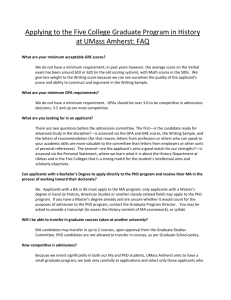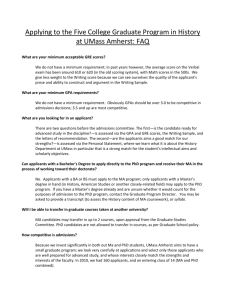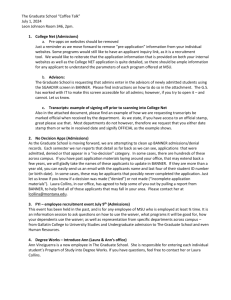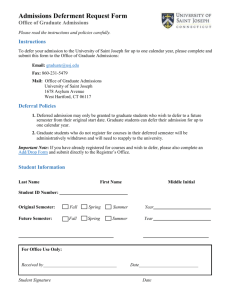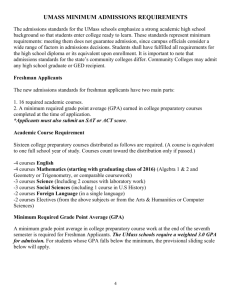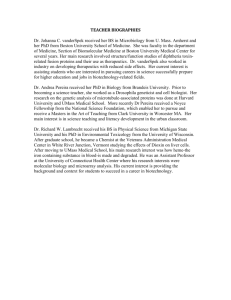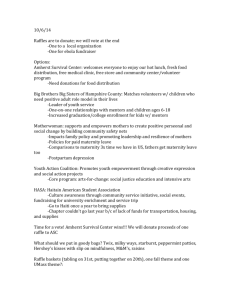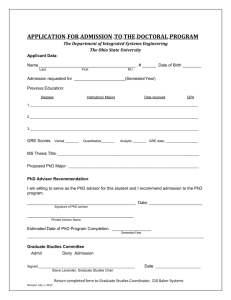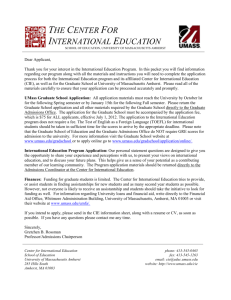Applying to the Five College Graduate Program in History at UMass
advertisement
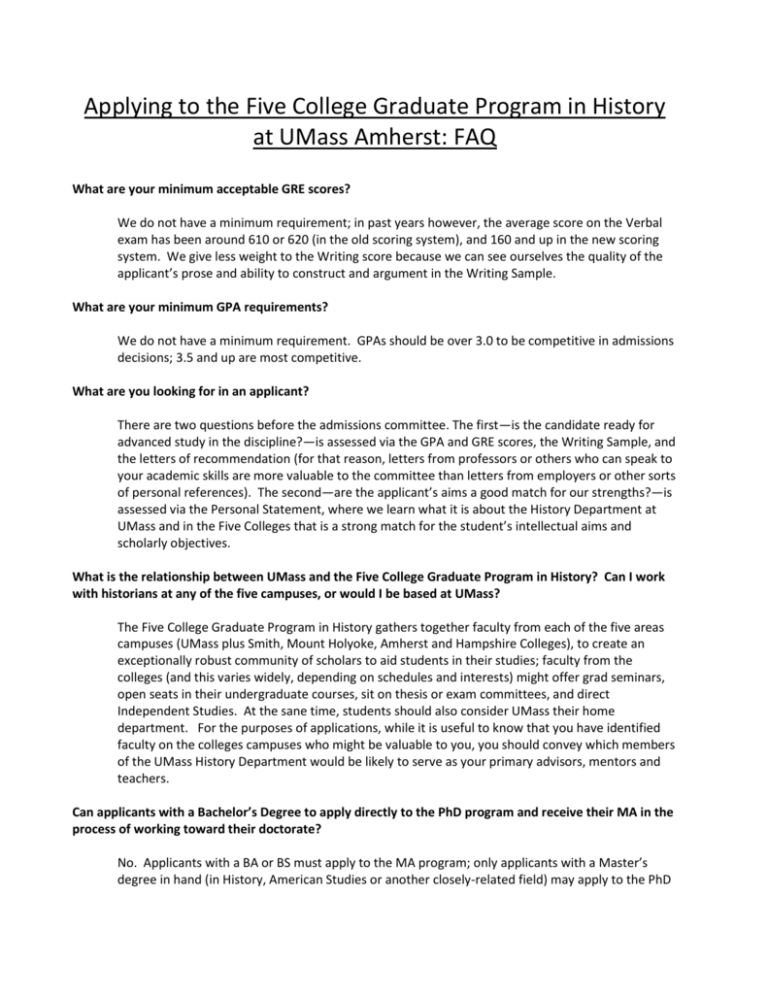
Applying to the Five College Graduate Program in History at UMass Amherst: FAQ What are your minimum acceptable GRE scores? We do not have a minimum requirement; in past years however, the average score on the Verbal exam has been around 610 or 620 (in the old scoring system), and 160 and up in the new scoring system. We give less weight to the Writing score because we can see ourselves the quality of the applicant’s prose and ability to construct and argument in the Writing Sample. What are your minimum GPA requirements? We do not have a minimum requirement. GPAs should be over 3.0 to be competitive in admissions decisions; 3.5 and up are most competitive. What are you looking for in an applicant? There are two questions before the admissions committee. The first—is the candidate ready for advanced study in the discipline?—is assessed via the GPA and GRE scores, the Writing Sample, and the letters of recommendation (for that reason, letters from professors or others who can speak to your academic skills are more valuable to the committee than letters from employers or other sorts of personal references). The second—are the applicant’s aims a good match for our strengths?—is assessed via the Personal Statement, where we learn what it is about the History Department at UMass and in the Five Colleges that is a strong match for the student’s intellectual aims and scholarly objectives. What is the relationship between UMass and the Five College Graduate Program in History? Can I work with historians at any of the five campuses, or would I be based at UMass? The Five College Graduate Program in History gathers together faculty from each of the five areas campuses (UMass plus Smith, Mount Holyoke, Amherst and Hampshire Colleges), to create an exceptionally robust community of scholars to aid students in their studies; faculty from the colleges (and this varies widely, depending on schedules and interests) might offer grad seminars, open seats in their undergraduate courses, sit on thesis or exam committees, and direct Independent Studies. At the sane time, students should also consider UMass their home department. For the purposes of applications, while it is useful to know that you have identified faculty on the colleges campuses who might be valuable to you, you should convey which members of the UMass History Department would be likely to serve as your primary advisors, mentors and teachers. Can applicants with a Bachelor’s Degree to apply directly to the PhD program and receive their MA in the process of working toward their doctorate? No. Applicants with a BA or BS must apply to the MA program; only applicants with a Master’s degree in hand (in History, American Studies or another closely-related field) may apply to the PhD program. If you have a Master’s degree already and are unsure whether it would count for the purposes of admission to the PhD program, contact the Graduate Program Director. You may be asked to provide a transcript (to assess the History content of MA coursework), or syllabi. Will I be able to transfer in graduate courses taken at another university? MA candidates may transfer in up to 2 courses, upon approval from the Graduate Studies Committee. PhD candidates are not allowed to transfer in courses, as per Graduate School policy. How competitive is admissions? Because we invest significantly in both our Ma and PhD students, UMass Amherst aims to have a small graduate program; we look very carefully at applications and select only those applicants who are well prepared for advanced study, and whose interests closely match the strengths and interests of the faculty. In a typical year, we accept only one in five applicants. When can I expect to hear if I’ve been accepted to the Graduate Program? Review of applications begins after the January deadline passes; in the first weeks, members of the admissions committee begin reviewing and evaluating materials. The committee typically meets for the first time during the first week of classes--that is, the last week of January. Deliberations usually take about a month. So the earliest people should expect to hear any result is the end of February or early March. PhD students are guaranteed funding packages with admissions, but for MA candidates, admission and funding decisions are made separately. Top applicants may be offered a funding package simultaneously with admission, but more often, Master's applicants are offered admission earlier in the Spring semester, and hear about funding packages later in the Spring semester. While we try to make funding offers in advance of the April 15th notification deadline, the department often obtains additional funding after that date; some students learn that they will be offered funding later in the Spring and even into the summer. What type of funding is available? All PhD students are awarded 3 full years of funding (that is, they are funded both semesters for 3 academic years), plus a 4th year of support in their final academic year of writing. This support generally comes in the form of classroom TA-ships, though a small number of administrative positions are available as well. We rarely have RA-ships to offer. Some MA students are offered funding during the admissions process as a means of recruitment; others gain support during the course of their studies via excellent performance in their classes. Approximately half of our MA students are funded at any given time. Typically, MA students are offered support one semester at a time. Support in any one of the 2 semesters that constitute an academic year secure waivers of tuition and most (not all) fees for both semesters. As of this writing (November 2011), a TA stipend for one semester is just over $8000, and engages waivers valued at up to $10,000 for Massachusetts residents and up to $20,000 for non-residents. Could you clarify the Five College connection? How does it work? Can I take classes at other schools? Work with other professors? Will I be considered a student at those colleges? etc. The Five College Consortium allows students in the Five College Graduate Program the opportunity to draw not only on the faculty at UMass Amherst, but also on the area’s other colleges: Smith, Mount Holyoke, Amherst and Hampshire. Typically those additional faculty members lead Independent Studies and supervise exam fields, though sometimes students enroll in four-college courses for graduate credit. Many common questions about the History department’s program can be answered by reading our Handbook (see the Grad Program website for links). Other answers can be found in the online handbook published by the Graduate School itself; see http://www.umass.edu/gradschool/handbook/.
